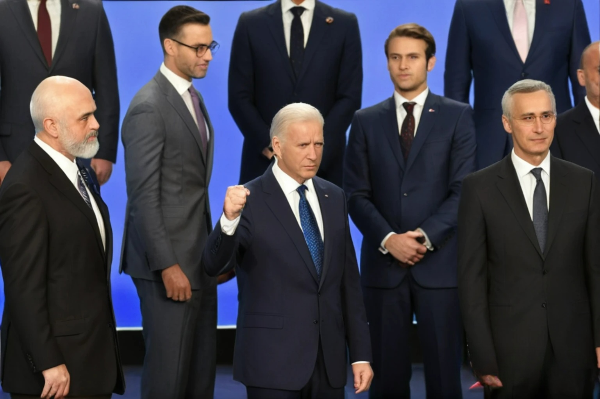Iran’s Plan to Strike Back Against the U.S.
Iran’s Military Preparations Following U.S. Attacks
Loading...

These pledges coincide with the U.S. announcing the deployment of longer-range missiles to Germany and strengthening defenses against Russia.
NATO leaders have committed to providing Ukraine with at least $43 billion in military aid over the next year to strengthen its defenses against Russia, and have officially declared Kyiv on an "irreversible path" to membership in the Western military alliance.
These commitments, outlined in a final communique following a NATO summit in Washington, DC, on Wednesday, also included individual and collective measures by alliance members to enhance Ukraine’s and Europe’s security.
Notably, the United States, Netherlands, and Denmark announced that the first NATO-provided F-16 fighter jets would be delivered to Ukrainian military pilots by this summer. Additionally, the U.S. revealed plans to deploy longer-range missiles in Germany by 2026, a significant move aimed at countering what the allies identify as Russia’s growing threat to Europe.
This deployment will bring the most potent U.S. weapons to Germany since the Cold War, a move previously prohibited under the Intermediate-Range Nuclear Forces Treaty of 1987, which collapsed in 2019.Ukrainian President Volodymyr Zelenskyy expressed his gratitude on social media platform X, acknowledging NATO’s efforts to strengthen Ukraine’s air force. He noted that the new fighter jets “bring just and lasting peace closer, demonstrating that terror must fail.”
NATO Secretary-General Jens Stoltenberg emphasized that while Ukraine will not immediately join the alliance, it must do so after the war to prevent future Russian aggression against Kyiv.
Stoltenberg clarified, "We are not doing this because we want to prolong a war. We are doing it because we want to end a war as soon as possible."
The U.S. and some other countries have opposed Ukraine’s membership during its conflict with Russia to avoid escalating tensions that could lead to a broader war. They also stress the need for Ukraine to address corruption and other systemic reforms.
The NATO communique also strengthened its stance on China, labeling it a “decisive enabler” of Russia’s war effort in Ukraine and highlighting Beijing’s systemic challenges to Euro-Atlantic security. Stoltenberg emphasized the significance of the 32 allies jointly identifying China as a decisive enabler of Russia’s war.
Stoltenberg also defended the alliance amid questions about Republican presidential candidate Donald Trump’s potential impact on U.S. support for NATO if he wins the November election. While Trump has criticized NATO allies for not investing enough in the alliance, Stoltenberg noted that the number of allies meeting the military spending target has increased significantly since 2021.
President Joe Biden, hosting the North Atlantic Council in Washington, DC, emphasized the importance of NATO, noting increased military spending and the doubling of battle groups on NATO’s eastern flank since he took office. He reassured allies of the U.S. commitment to defending NATO territory.
The summit, featuring leaders from the 32 NATO countries and Pacific partners Australia, Japan, New Zealand, South Korea, and Ukraine, is expected to be one of Biden’s last international appearances before the U.S. election. Despite concerns about Biden's political standing, the pledges of aid to Ukraine are seen as crucial in the short term.
Former U.S. Assistant Secretary of State for Public Affairs PJ Crowley highlighted the importance of sustaining and rebuilding Ukraine, noting that strengthening Ukraine’s position is vital before any necessary negotiations.
Iran’s Military Preparations Following U.S. Attacks
Troops remain in five strategic locations, raising fears of renewed tensions and long-term occupation.
Opposition forces have taken control of the capital after a significant offensive. Here is how it unravelled.
